本文最后更新于:2017年7月12日 凌晨
Kotlin整体的性能相对于Java而言毫不逊色,甚至在一些方面优于Java,本文参考这篇benchmark文章进行Kotlin性能相关总结,关于Kotlin对包大小影响、使用、选择原因等请参考之前的一篇Kotlin的文章,如果对于Java运行时性能感兴趣可以参考这篇文章。
前言
根据benchmark文章所有的所有测试均采样200次,使用单位ops/ms(执行次数/毫秒)(因此数值是越大越好)并且均在以下环境:
- Macbook Pro (2,5 GHz Intel Core i7, 16GB of RAM)
- Java HotSpot(TM) 64-Bit Server VM (build 25.131-b11, mixed mode)
- Kotlin version (1.1.3)
- JMH (0.5.6)
性能测试结果
1. 性能相比Java更差相关
- 对
varargs参数展开,Kotlin比Java慢1倍,主要原因是在Kotlin在展开varargs前需要全量拷贝整个数组,这个是非常高的性能开销。
- 对
Delegated Properties的应用,**Kotlin相比Java慢10%**。
2. 性能相比Java更优相关
- 对
Lambda的使用,**Kotlin相比Java快30%**,而对用例中的transaction添加inline关键字配置内联后,发现其反而慢了一点点(约1.14%)。
- Kotlin对
companion object的访问相比Java中的静态变量的访问,Kotlin与Java差不多快或更快一点。
- Kotlin对局部函数(
Local Functions)的访问相比Java中的局部函数的访问,Kotlin与Java差不多快或更快一点。
- Kotlin的非空参数的使用相比没有使用空检查的Java,Kotlin与Java差不多快或更快一点。
3. Kotlin自身比较
- 对于基本类型范围的使用,无论是否使用
常量引用还是直接的范围速度都差不多。
- 对于非基本类型范围的使用,
常量引用相比直接的范围会快3%左右。
- 对于范围遍历方式中,
for循环方式无论有没有使用step速度都差不多,但是如果对范围直接进行.foreach速度会比它们慢3倍,因此避免对范围直接使用.foreach。
- 在遍历中使用
lastIndex会比使用indices快2%左右。
实验过程
I. 性能相比Java更差相关
1. varargs参数
测试发现: 对varargs参数展开,Kotlin比Java慢1倍,主要原因是在Kotlin在展开varargs前需要全量拷贝整个数组,这个是非常高的性能开销。
测试用例Kotlin代码:
1
2
3
4
5
6
7
8
9
|
fun runPrintDouble(blackHole: BlackHole, values: IntArray) {
printDouble(blackHole, *values)
}
fun printDouble(blackHole: BlackHole, vararg values: Int) {
for (value in values) {
blackHole.consume(value)
}
}
KOTLIN
|
测试用例Java代码:
1
2
3
4
5
6
7
8
9
|
public static void runPrintDouble( BlackHole blackHole, int[] values ) {
printDouble( blackHole, values );
}
public static void printDouble( BlackHole blackHole, int... values ) {
for (int value : values) {
blackHole.consume( value );
}
}
JAVA
|
测试结果(每毫秒执行次数):
| Benchmark | 平均值 | 平均误差 |
|---|
javaIntVarargs |
173265.270 |
260.837 |
kotlinIntVarargs |
83621.509 |
990.854 |
![]()
2. Delegated Properties
测试发现:对Delegated Properties的应用,**Kotlin相比Java慢10%**。
测试用例Kotlin代码:
1
2
3
4
5
6
7
8
9
10
11
12
13
14
15
16
17
18
19
20
21
22
23
24
25
26
|
class StringDelegate {
private var cache: String? = null
operator fun getValue(thisRef: Any?, property: KProperty<*>): String {
var result = cache
if (result == null) {
result = someOperation()
cache = result
}
return result!!
}
operator fun setValue(thisRef: Any?, property: KProperty<*>, value: String) {
cache = value
}
}
class Example {
var p: String by StringDelegate()
}
fun runStringDelegateExample(blackHole: BlackHole) {
val example = Example()
blackHole.consume(example.p)
blackHole.consume(example.p)
}
KOTLIN
|
测试用例Java代码:
1
2
3
4
5
6
7
8
9
10
11
12
13
14
15
16
17
18
19
20
21
22
23
24
|
class DelegatePropertyTest {
public static String stringValue = "hello";
public static String someOperation() {
return stringValue;
}
}
class Example2 {
public String p;
public void initialize() {
p = DelegatePropertyTest.someOperation();
}
}
public static void runStringDelegateExample( BlackHole blackHole ) {
Example2 example2 = new Example2();
example2.initialize();
blackHole.consume( example2.p );
blackHole.consume( example2.p );
}
JAVA
|
测试结果(每毫秒执行次数):
| Benchmark | 平均值 | 平均误差 |
|---|
javaSimplyInitializedProperty |
274394.088 |
554.171 |
kotlinDelegateProperty |
255899.824 |
910.112 |
![]()
II. 性能相比Java更优相关
1. Lambda
由于Lambda是在Java8中引入,所以对比的是Java8与Kotlin1.1.3
测试发现:对Lambda的使用,**Kotlin相比Java快30%**,而对用例中的transaction添加inline关键字配置内联后,发现其反而慢了一点点(约1.14%)。
测试用例Kotlin代码:
1
2
3
4
5
6
7
8
9
10
11
12
13
14
15
16
|
fun transaction(db: Database, body: (Database) -> Int): Int {
db.beginTransaction()
try {
val result = body(db)
db.setTransactionSuccessful()
return result
} finally {
db.endTransaction()
}
}
fun kotlinLambda() {
val deletedRows = transaction(db) {
it.delete("Customers", null, null)
}
}
KOTLIN
|
测试用例Java代码:
1
2
3
4
5
6
7
8
9
10
11
12
13
14
15
|
public static int transaction( Database db, ToIntFunction<Database> body ) {
db.beginTransaction();
try {
int result = body.applyAsInt( db );
db.setTransactionSuccessful();
return result;
} finally {
db.endTransaction();
}
}
void javaLambda() {
int deletedRows = transaction( db, ( database ) ->
database.delete( "Customer", null, null ) );
}
JAVA
|
测试结果(每毫秒执行次数):
| Benchmark | 平均值 | 平均误差 |
|---|
javaLambda |
1024302.409 |
1851.789 |
kotlinInlinedFunction |
1344885.445 |
2632.587 |
kotlinLambda |
1362991.121 |
2824.862 |
![]()
2. 静态(Companion Objects)变量访问
测试发现:Kotlin对companion object的访问相比Java中的静态变量的访问,Kotlin与Java差不多快或更快一点。
测试用例Kotlin代码:
1
2
3
4
5
6
7
8
9
10
11
12
13
14
15
|
class MyClass private constructor() {
companion object {
private val TAG = "TAG"
fun newInstance() = MyClass()
}
fun helloWorld() = TAG
}
fun runCompanionObjectCallToPrivateConstructor(): String {
val myClass = MyClass.newInstance()
return myClass.helloWorld()
}
KOTLIN
|
测试用例Java代码:
1
2
3
4
5
6
7
8
9
10
11
12
13
14
15
16
17
18
19
20
|
class MyJavaClass {
private static final String TAG = "TAG";
private MyJavaClass() {
}
public static String helloWorld() {
return TAG;
}
public static MyJavaClass newInstance() {
return new MyJavaClass();
}
}
public static String runPrivateConstructorFromStaticMethod() {
MyJavaClass myJavaClass = newInstance();
return myJavaClass.helloWorld();
}
JAVA
|
测试结果(每毫秒执行次数):
| Benchmark | 平均值 | 平均误差 |
|---|
javaPrivateConstructorCallFromStaticMethod |
398709.154 |
800.190 |
kotlinPrivateConstructorCallFromCompanionObject |
404746.375 |
621.591 |
![]()
3. 局部函数(Local Functions)访问
测试发现:Kotlin对局部函数的访问相比Java中的局部函数的访问,Kotlin与Java差不多快或更快一点。
测试用例Kotlin代码:
1
2
3
4
5
6
7
8
9
10
11
|
fun kotlinLocalFunctionCapturingLocalVariable(a: Int): Int {
fun sumSquare(b: Int) = (a + b) * (a + b)
return sumSquare(1) + sumSquare(2)
}
fun kotlinLocalFunctionWithoutCapturingLocalVariable(a: Int): Int {
fun sumSquare(a: Int, b: Int) = (a + b) * (a + b)
return sumSquare(a, 1) + sumSquare(a, 2)
}
KOTLIN
|
测试用例Java代码:
1
2
3
4
5
|
public static int javaLocalFunction( int a ) {
IntUnaryOperator sumSquare = ( int b ) -> ( a + b ) * ( a + b );
return sumSquare.applyAsInt( 1 ) + sumSquare.applyAsInt( 2 );
}
JAVA
|
测试结果(每毫秒执行次数):
| Benchmark | 平均值 | 平均误差 |
|---|
javaLocalFunction |
897015.956 |
1951.104 |
kotlinLocalFunctionCapturingLocalVariable |
909087.356 |
1690.368 |
kotlinLocalFunctionWithoutCapturingLocalVariable |
908852.870 |
1822.557 |
![]()
4. 空检查(Null safety)
测试发现:Kotlin的非空参数的使用相比没有使用空检查的Java,Kotlin与Java差不多快或更快一点。
测试用例Kotlin代码:
1
|
fun sayHello(who: String, blackHole: BlackHole) = blackHole.consume("Hello $who")
KOTLIN
|
测试用例Java代码:
1
2
3
|
public static void sayHello( String who, BlackHole blackHole ) {
blackHole.consume( "Hello " + who );
}
JAVA
|
测试结果(每毫秒执行次数):
| Benchmark | 平均值 | 平均误差 |
|---|
javaSayHello |
73353.725 |
155.551 |
kotlinSayHello |
75637.556 |
162.963 |
![]()
III. Kotlin自身比较
1. 基本类型范围
测试发现: 对于基本类型范围的使用,无论是否使用常量引用还是直接的范围速度都差不多。
常量引用基本类型范围用例:
1
2
3
|
private val myRange get() = 1..10
fun isInOneToTenWithIndirectRange(i: Int) = i in myRange
KOTLIN
|
直接引用基本类型范围的用例:
1
|
fun isInOneToTenWithLocalRange(i: Int) = i in 1..10
KOTLIN
|
测试结果(每毫秒执行次数):
| Benchmark | 平均值 | 平均误差 |
|---|
kotlinIndirectRange |
1214464.562 |
2071.128 |
kotlinLocallyDeclaredRange |
1214883.411 |
1797.921 |
![]()
2. 非基本类型范围
测试发现: 对于非基本类型范围的使用,常量引用相比直接的范围会快3%左右。
常量引用非基本类型范围用例:
1
2
3
4
5
|
private val NAMES = "Alfred".."Alicia"
fun isBetweenNamesWithConstantRange(name: String): Boolean {
return name in NAMES
}
KOTLIN
|
直接引用非基本类型范围的用例:
1
2
3
|
fun isBetweenNamesWithLocalRange(name: String): Boolean {
return name in "Alfred".."Alicia"
}
KOTLIN
|
测试结果(每毫秒执行次数):
| Benchmark | 平均值 | 平均误差 |
|---|
kotlinStringRangeInclusionWithLocalRange |
211468.439 |
483.879 |
kotlinStringRangeInclusionWithConstantRange |
218073.886 |
412.408 |
![]()
3. 范围遍历
测试发现: 对于范围遍历方式中,for循环方式无论有没有使用step速度都差不多,但是如果对范围直接进行.foreach速度会比它们慢3倍,因此避免对范围直接使用.foreach。
for循环的用例:
1
2
3
4
5
|
fun rangeForEachLoop(blackHole: BlackHole) {
for (it in 1..10) {
blackHole.consume(it)
}
}
KOTLIN
|
for循环并且加上step的用例:
1
2
3
4
5
|
fun rangeForEachLoopWithStep1(blackHole: BlackHole) {
for (it in 1..10 step 1) {
blackHole.consume(it)
}
}
KOTLIN
|
对范围直接进行.foreach的用例:
1
2
3
4
5
|
fun rangeForEachMethod(blackHole: BlackHole) {
(1..10).forEach {
blackHole.consume(it)
}
}
KOTLIN
|
测试结果(每毫秒执行次数):
| Benchmark | 平均值 | 平均误差 |
|---|
kotlinRangeForEachFunction |
108382.188 |
561.632 |
kotlinRangeForEachLoop |
331558.172 |
494.281 |
kotlinRangeForEachLoopWithStep1 |
331250.339 |
545.200 |
![]()
4. 对于indices对比
测试发现: 使用lastIndex会比使用indices快2%左右。
先创建一个SparseArray:
1
2
3
4
|
class SparseArray<out T>(val collection: List<T>) {
fun size() = collection.size
fun valueAt(index: Int) = collection[index]
}
KOTLIN
|
使用indices的用例:
1
2
3
4
5
6
7
8
|
inline val SparseArray<*>.indices: IntRange
get() = 0..size() - 1
fun printValuesUsingIndices(map: SparseArray<String>, blackHole: BlackHole) {
for (i in map.indices) {
blackHole.consume(map.valueAt(i))
}
}
KOTLIN
|
使用lastIndex的用例:
1
2
3
4
5
6
7
8
|
inline val SparseArray<*>.lastIndex: Int
get() = size() - 1
fun printValuesUsingLastIndexRange(map: SparseArray<String>, blackHole: BlackHole) {
for (i in 0..map.lastIndex) {
blackHole.consume(map.valueAt(i))
}
}
KOTLIN
|
测试结果(每毫秒执行次数):
| Benchmark | 平均值 | 平均误差 |
|---|
kotlinCustomIndicesIteration |
79096.631 |
134.813 |
kotlinIterationUsingLastIndexRange |
80811.554 |
122.462 |
![]()
Kotlin运行时性能
https://blog.dreamtobe.cn/kotlin-performance/
https://blog.dreamtobe.cn/kotlin-performance/



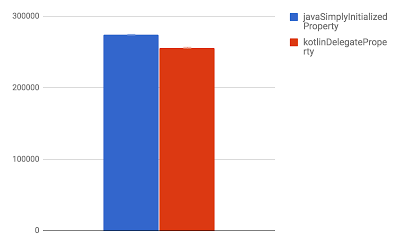
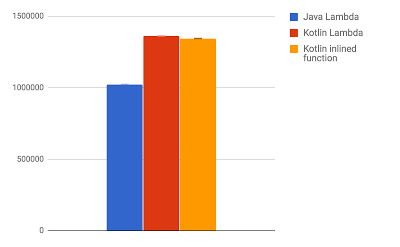
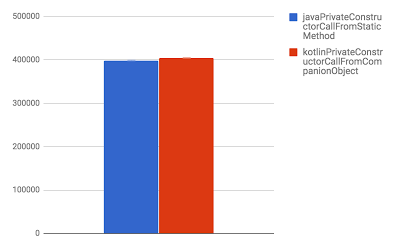
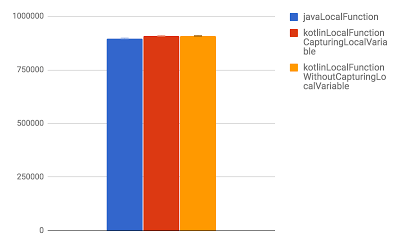
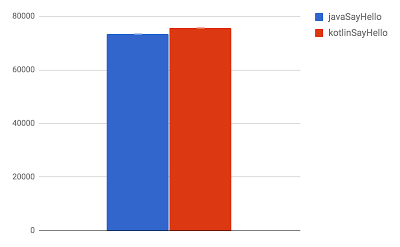
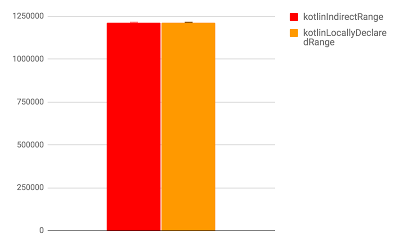
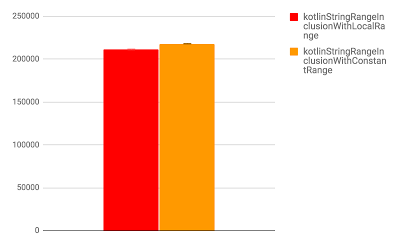
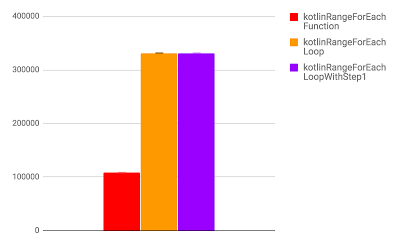


 浙公网安备 33010602011771号
浙公网安备 33010602011771号